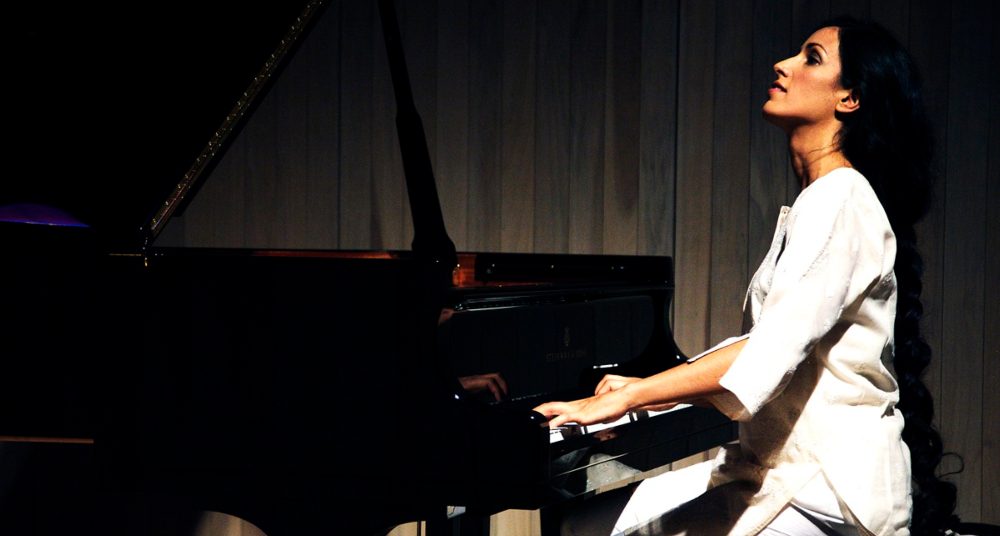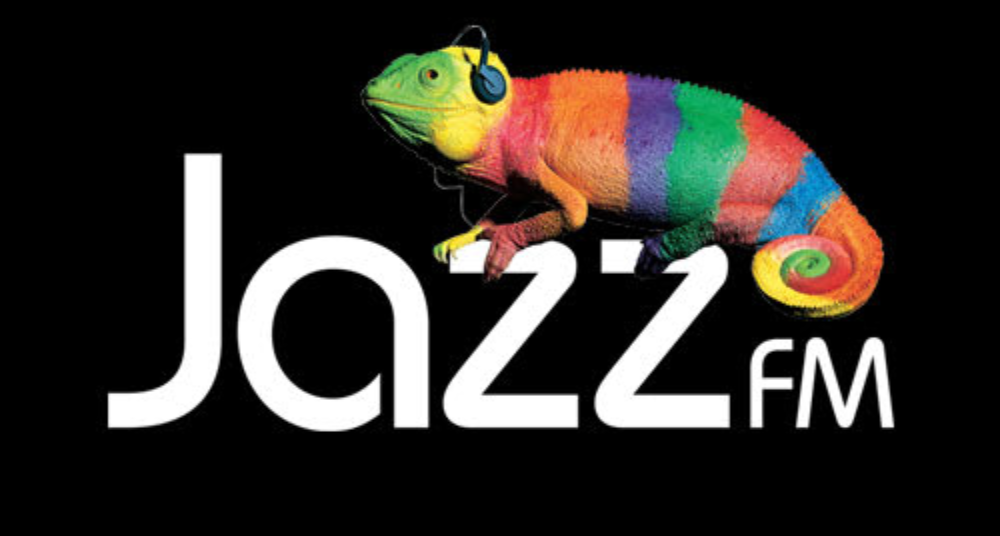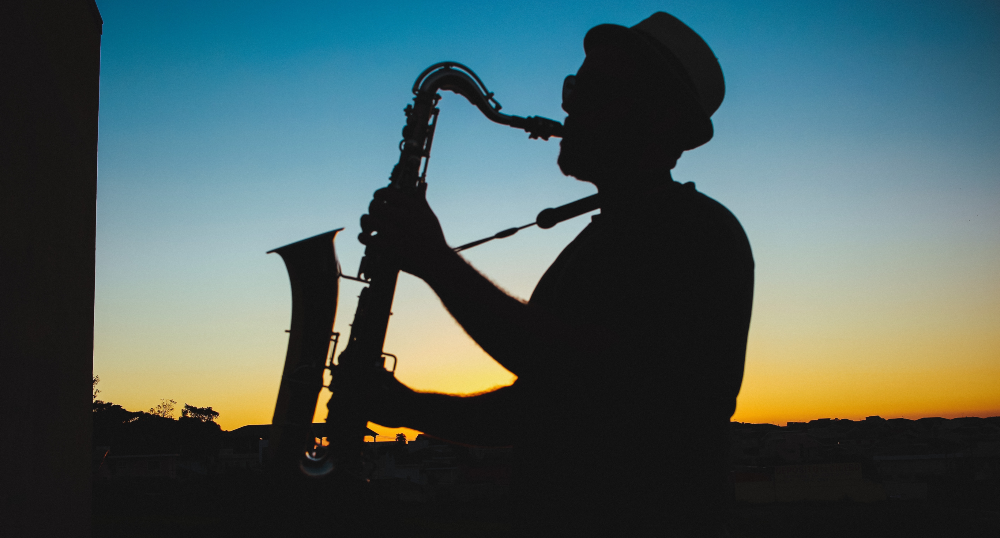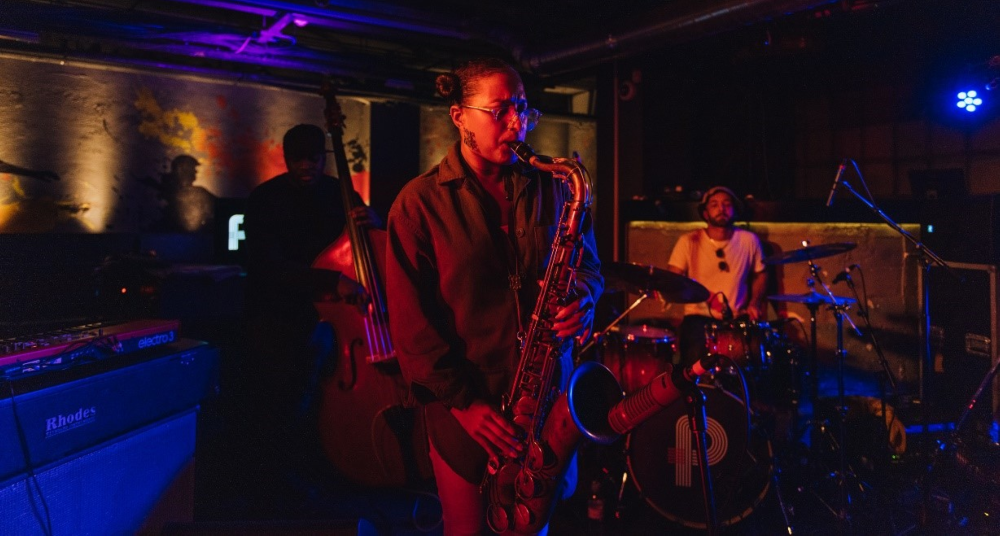Zoe Rahman has been nominated for — and won — plenty of awards in her time, including a MOBO for Best Jazz Act in 2012 for her album Kindred Spirits, and has carved out a reputation for herself as one of the most remarkable pianists of her age. The Ivors themselves have described Rahman as 'one of Britain’s most powerful compositional voices and important contemporary artists who puts a spotlight on jazz from the UK as an international musical force.’ Working with the likes of Courtney Pine, George Mraz and Jerry Dammers, she is renowned for writing with originality as she thrillingly mixes elements of jazz heritage with a classical background.
In the days before collecting her Impact Award, M Magazine spoke to Zoe over Zoom and found a composer remarkably humble about receiving this momentous accolade — a moment that she admits she never thought would happen.
'I think women have been underrecognised, undervalued and underrepresented, and not from lack of talent.'
Thank you for making the time today and congratulations on receiving the Impact Award from the Ivors. How does it feel?
Amazing. It's incredible. I don't know how that happened (laughs). But yeah, it's a real honour.
What is getting that sort of recognition like for you as an artist and composer?
I compose because I love writing music and I love playing music and sharing the joy of music with people. I've been plugging away at it without a huge amount of support network around me in terms of management or record labels. Not by choice, but just that's the situation I've always existed in. It's funny, about 20 years ago I was talking about how you're a young and up-and-coming musician for years. And then suddenly one day, you wake up and you're a veteran. There's no middle ground! I feel like with this award, I've finally reached that point.
What was your reaction when you got the call?
I was shocked and pretty emotional. I've had a lot of support from fellow musicians and family over the years but working as a jazz musician — particularly a female jazz musician — that's been a struggle for me, as it has been for other women. On that level, this is hugely appreciated.
Jazz is still a largely male-dominated genre, isn't it?
Yeah, it is. I think women have been underrecognised, undervalued and underrepresented, and not from lack of talent. There have been plenty of women over the years in jazz who have written incredible music and performed amazingly, but they just don't get the recognition that they've deserved. And I think this award for me is special in that respect.
'Things are certainly changing now because as a society we're having to change. That change has been forced upon us, which is a great thing.'
In the time you've been working in jazz, have you seen much change in the opportunities given to women in jazz?
Things are certainly changing now because as a society we're having to change. That change has been forced upon us, which is a great thing. But in terms of my career, my first album was 20 years ago now. For all the people that say, ‘Oh, we've always supported women,’ well I didn't really see that myself. And there weren't that many other women out there in my time — not in as many numbers as there are now. It's all very easy in hindsight to say you supported women, but that wasn't my reality.
And you're the one to know.
Exactly (laughs). But I carried on, I persevered, because that's what I wanted to do. It didn't stop me. Life could have been a lot easier up to this point. There's a lot more creativity that could have happened in those years but that's the same for all composers. Also, throw into the mix a couple of children. But that's another aspect that has given me a whole new lease of life creatively. That is a whole other perspective when you're writing and you're creating.
What is it about the Ivors that stands out for you?
I think it's because it is people who are really listening to your music from a compositional point of view. Aside from whether they just like it, or they're emotionally drawn to it, they’re just actually engaging with it on a slightly different level. There is a real understanding from other people who do create and compose, and they understand what it takes.
What kind of writing and composing have you enjoyed doing the most?
I think mainly I really enjoy writing music for my band and myself to play. I've got a whole new set of compositions that I want to record, and it's just finding the energy and the time and the right space to do that. This award has pushed me to think that I really should get this out because some people are listening, and they are interested. It is quite hard when you're just doing it in isolation and you don't really know the impact it's having on people.
I'm not one of these people who can sit in a room and hear an orchestra in my head and write that down. I like to experiment on the piano and I think that's why the music is specific to me. I’m really into grooves and basslines, then I've got this amazing piano in front of me which in itself is a very orchestral and percussive instrument. When you're writing for other instruments and working with instrumentalists, you have to think in a very different way. But when I'm sitting writing at the piano, I'm not thinking about that. I'm just thinking where is this tune leading me? And then afterwards when I come to write it for people or play with other people, then I think, ‘Oh, actually, you can't do that on that instrument. But never mind, give it a go.’
'People really need music right now. They did anyway, but now they really realise it.'
How's it been playing live again with Courtney Pine?
Being back on the road has been fantastic and playing anywhere after the pandemic has been amazing. It is just incredible to feel that audience engagement and the emotions there are very palpable. People really need music right now. They did anyway, but now they really realise it.
What has been your favourite live moment this year?
I did a gig the other day in my local primary school and it was one of the best experiences. It was part of the London Jazz Festival, I wrote a song last year to help the kids win Jamie Cullum's piano! When we did the gig, I thought, 'Well, we've got this piano in school, I just want to use it as a way to bring the local community in.' It was beautiful. All my neighbours and friends came and the local community came out. It's not a place where people are passing by, but it was absolutely packed. On the front row, there were primary school kids who were four or five years old. We played until nine o'clock at night on a Sunday and they all stayed up and were completely engaged. With children, they're so open and they just completely made the gig for us as musicians, as well as the rest of the audience. It was a very warm, loving experience. And that's what music for me should be.
With all your teaching experience, have you ever taught children as young as that? Can you teach a four year old jazz music?
You CAN teach a four year old jazz! I think that's the funny thing about jazz. I don't know why people think you can’t do that, it's just music. Kids have got ears, they feel the music and that's all that jazz is. It's an oral tradition, really? You learn it in a different way to the way you learn classical music but it's all music. Children can really respond to it. Anybody can improvise, and even at that age children can be brought into the music and they can improvise. It's like having a conversation musically.
'We need some positivity, we need some hope and love. We need mutual understanding and for people to come together. Music does all those things.'
Who inspired you when you were young?
When I was very young at primary school, there was loads of music going on. It's just not the same these days. My old classroom teacher — Mrs Hawkins — was a piano player, she used to run recorder class, and guitar class. We were always doing shows at school, it was just an ordinary primary school. There wasn't any question of it being separated from your normal life, it’s just part of what you did at school. Then at home, we were playing piano. I grew up in a musical family so it was just a part of life really.
Music isn’t always taught at the youngest ages now.
Yeah, I think that's really been lost. Partly this award acknowledges that, and I wish people would acknowledge it more. People ask what my day job is? Well, this is my job, this is what I do. This is my life and it is really part of who we are. Especially now after a pandemic, there is a generation of children who were brought up looking at a computer screen. They were not engaged or able to engage, or able to play with other children or go to Granny's house. Just to have access to music and to be able to express themselves emotionally and engage on that level — I wish people would recognise that more and understand it because children respond to it.
It must be lovely to see the looks on their faces, and to see that they're really engaging with it.
They were just so excited, it was really funny. A couple fell asleep, but that's natural. I think the adults stayed awake.
It's great to see music enriching lives again, isn't it?
We need some positivity, we need some hope and love. We need mutual understanding and for people to come together. Music does all those things. But the other thing about the pandemic for composers, it really brought home that they're undervalued. Music generally is undervalued — it's become a free for all — but how do you think these people live? People who compose are real people, they take time to do these things. You have to live.
Read M Magazine's interview with Zoe Rahman's collaborator, jazz legend Courtney Pine.





